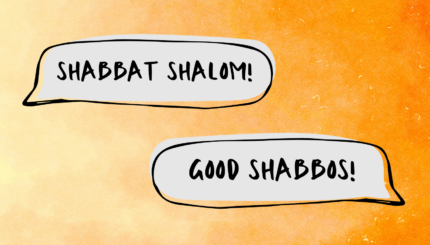Despite the fact that the Torah mentions the word “Shabbat” more than 80 times, only a few of these references actually deal specifically with how one is to observe the Sabbath day, and only two of them tell us why. However, these two reasons for observing the Shabbat are intriguing and significant.
Rest and Remember
The first reason the Torah gives begins in the book of Genesis: “On the seventh day, God finished that work that He had been doing…. And God blessed the seventh day and declared it holy, because on it God ceased from all the work of creation that He had done.” (Genesis 2:2-3). Although there is no mention here that human beings should also observe a Sabbath, in the book of Exodus (in the first articulation of the Ten Commandments), God declares that the Israelites should “remember the Sabbath day and keep it holy…for in six days the Lord made heaven and earth and sea, and all that is in them, and He rested on the seventh day; therefore the Lord blessed the Sabbath day and hallowed it.” (Exodus 20:8, 11).
Together, these passages give us the profound concept of imitatio dei — the imitation of God — in association with Shabbat. We should rest because God rested — and we should “remember” Shabbat and keep it holy. We also implicitly learn that even God, as it were, needs a break. And if God, the creator of the universe, needed to rest (and sanctified that rest), how much the more so do we human beings need a weekly opportunity to cease from all productive activities, from “creating.”
Covenant and Commandment
The second reason the Torah gives for observing Shabbat appears in the version of the Ten Commandments presented in the Book of Deuteronomy. God says, “Remember that you were a slave in the land of Egypt and the Lord your God freed you from there with a mighty hand and an outstretched arm; therefore the Lord your God has commanded you to observe Shabbat” (Deuteronomy 5:15). This explanation touches on two momentous motivations for observing Shabbat. The first is the covenant between God and the Jewish people: God redeemed the Israelites from slavery, and the Israelites must observe God’s commandments. The second motivation suggested by these phrases is one of deep empathy with our enslaved ancestors. Because our forebears who were slaves were unable to enjoy a day of rest, we should observe Shabbat as a demonstration of our own redeemed status–and perhaps, with a consciousness about those who are still enslaved.
The Sabbath Bride
Jewish tradition continued to expand and embellish these theological themes of Shabbat. In late antiquity, according to the Talmud, the rabbis used to dress in white garments, as a bridegroom, and walk out among the hills calling, “Come my Beloved, let us greet the Shabbat bride!” This is the basis for the liturgical poem Lecha Dodi (“come my beloved”) sung as part of Friday night services, a composition that emerged out of the kabbalistic or Jewish mystical tradition. In Jewish mysticism, the theme of Shabbat as the “Sabbath bride” further developed, and Shabbat is also associated with the feminine tangible presence of God, called the Shekhinah, or “in-dwelling,” of God. Shabbat was thought of as a day of mystical union between the Jewish people and God. Reflecting the intimacy of this spiritual union, some medieval Jewish mystical texts speak of Shabbat as an especially propitious day for a husband and wife to be intimate with each other, as a symbolic union of God and the Jewish people.
Heschel and the “Cathedral in Time”
The great 20th-century Jewish theologian Rabbi Abraham Joshua Heschel, in his influential work The Sabbath, poetically articulates the notion of Shabbat as “a cathedral in time” — a “place” in time rather than space in which we develop the practices of sacred rest, and focus on being in the world rather than transforming it.
Sign up for My Jewish Learning’s RECHARGE, a weekly email with a collection of Shabbat readings and more to enhance your day of rest experience.
Shabbat
Pronounced: shuh-BAHT or shah-BAHT, Origin: Hebrew, the Sabbath, from sundown Friday to sundown Saturday.
Torah
Pronunced: TORE-uh, Origin: Hebrew, the Five Books of Moses.



